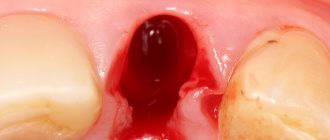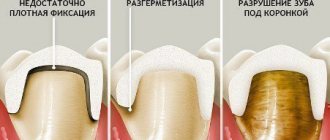A metallic taste may appear due to the consumption of specific foods or simple bleeding gums. Usually it does not linger for long and disappears without any outside intervention.
If a metallic taste in the mouth occurs repeatedly and for no apparent reason, then it is better to talk about the problem with a doctor.
. It is necessary to identify and eliminate the factor that led to the change in taste perception. But doing this on your own can be difficult, since many pathologies are asymptomatic and are detected only through laboratory tests.
Why does a metallic taste appear in the mouth?
A specific taste is felt due to an increase in the concentration of metal ions in the human body. It is extremely rare that this occurs as a result of chemical poisoning. For example, arsenic, zinc or cadmium.
Most poisonings occur at production facilities and laboratories where toxic compounds are used. Persons working with hazardous substances should not ignore even the slightest change in perception. Carelessness can cost them their lives.
More common causes of a metallic taste in the mouth are associated with exposure to external circumstances, the development of common diseases, hormonal imbalances or side effects from medications.
Treatment
Drug therapy, regimen, course, and duration of treatment are selected individually in each specific case. The choice of treatment methods depends on the root cause, age, and general physiological condition of the person.
Patients may be prescribed:
- enzyme agents;
- symptomatic medications;
- immunomodulators;
- hepatoprotectors;
- antibacterial, antiparasitic complex drugs;
- diuretics, hormones;
- anti-inflammatory drugs.
If bad breath is caused by acute or chronic pathologies or diseases, much attention is paid to symptomatic therapy and complex treatment.
Aerosols that suppress the development of pathogenic flora and special antiseptic solutions will help:
- Stopagin. A complex drug with a pronounced antiparasitic and antibacterial effect. Prescribed for rinsing.
- Chlorhexidine. Has an aseptic, bactericidal effect. Used to treat pathologies of the urinary system.
- Hexoral. An effective remedy for the treatment of dental diseases.
If endocrine disorders are diagnosed, treatment therapy is carried out under the supervision of the attending physician. Drugs are prescribed to suppress the activity of the thyroid gland, normalize its functioning, and secretory activity. For thyrotoxicosis, radioactive iodine is used.
For renal diseases, drug therapy depends on the form and stage of the underlying disease. Diuretics, anti-inflammatory, and antibacterial agents with complex effects may be prescribed, the action of which is aimed at relieving the clinical symptoms of the disease.
If uremic stench is provoked by strict diets, prolonged fasting, unbalanced nutrition, the attending physician or nutritionist will adjust the diet and prescribe a special diet to normalize metabolic processes and water and electrolyte balance in the body.
Influence of household factors
An iron taste may appear after drinking tap water. Huge amounts of iron-containing sediment accumulate in old pipes
, which dissolve in water and, entering the oral cavity with it, settle on the mucous membrane and oxidize. And the person begins to feel a sour smell and a metallic taste.
Mineral water can cause the same reaction. Many people drink it uncontrollably to enrich the body with microelements. However, their excess is no less harmful to health than their deficiency. Therefore, doctors do not recommend drinking more than 2 glasses of ordinary medicinal table mineral water per day.
Another common household factor is the use of stainless steel, aluminum or cast iron cookware
. If you cook a dish with foods high in acids in it, the latter will react with the material, which will lead to the appearance of a metallic taste.
Prevention
Regardless of the age of the patient, every pathological tooth must be treated. The following preventive measures will help prevent the disease:
- Regular visits to the dentist.
- Timely treatment of internal systems and organs.
- Careful oral hygiene.
- Eat well, drink plenty of fluids.
- The presence of fruits and vegetables in the menu.
- Cleaning the tongue with a special brush.
- Using a humidifier.
The main component of success is a healthy lifestyle.
Impact of common diseases
In addition to everyday factors, changes in taste perception are affected by internal pathologies. An unpleasant symptom in this case is observed over a long period of time.
Oral diseases
Quite often, the taste of metal indicates the development of the following dental diseases:
- Glossitis
is an infectious inflammation of the mucous membrane of the tongue, provoked by thermal, chemical burns or injuries. The main symptoms are swelling of the muscle organ, redness of its surface, a feeling of bitterness and an iron smell from the mouth. - Periodontal disease and periodontitis
are diseases that affect the gums. The inflammatory process provokes deformation of the periodontium - the tissues that surround the tooth. As a result, capillaries are damaged and bleeding develops. Blood, which contains large amounts of iron, gives saliva a metallic taste. - Gingivitis
is an inflammation of the gums, which is accompanied by redness, swelling and bleeding. Additional signs include pain, heavy plaque and acidic breath.
Pathologies of ENT organs
Sometimes a metallic taste on the tongue indicates a fungal infection of the mucous membranes of the pharynx, larynx, nose and paranasal sinuses. The following signs may indicate the development of an infectious process:
- sore throat;
- hearing loss;
- bleeding from the nose;
- feeling of dryness in the mouth;
- pain in the auricle or in the paranasal sinuses;
- increased sensitivity of mucous membranes to foods at borderline temperatures and spicy foods;
- a cheesy white coating covering the affected area and thickening abundantly in the morning.
Anemia
Another common cause of a metallic taste in the mouth is an imbalance of minerals. This phenomenon is observed in anemia, a pathological condition characterized by a decrease in the concentration of hemoglobin and, sometimes, red blood cells per unit volume of blood.
Despite the paradox, one of the main symptoms of an illness closely associated with iron deficiency is an iron taste in the mouth. In addition, for anemia:
- drowsiness and weakness appear;
- migraine attacks occur;
- often feel dizzy;
- heart rhythm is disturbed;
- mucous membranes are dehydrated;
- nails become brittle;
- tongue goes numb.
To confirm anemia, a routine blood test is performed. After treatment, which includes taking iron-containing drugs, the hemoglobin concentration normalizes - the metallic taste disappears.
Hypovitaminosis
A lack of vitamins can also lead to an iron taste in the mouth. This condition of the body is called hypovitaminosis and is characterized by symptoms such as sleep disturbances, low physical and intellectual activity, and groundless irritability.
A certain disease develops against the background of vitamin deficiency. For example, a lack of vitamin B1 can lead to pathologies such as beriberi, polyneuritis, paralysis, and central nervous system damage. Each disease has more specific symptoms.
A general list of possible signs:
- blurred vision;
- frequent conjunctivitis;
- constipation;
- nausea;
- decreased appetite;
- headache;
- paralysis;
- tachycardia;
- dyspnea;
- amyotrophy;
- nosebleeds;
- allergic manifestations.
Gastrointestinal diseases
The most common prerequisite for the occurrence of a metallic taste in the mouth in both men and women is pathology of the gastrointestinal tract. Moreover, by the severity of the sensation one can judge the stage of development of the disease.
| Affected organ | Probable diseases | General symptoms |
| Gallbladder |
|
|
| Stomach |
|
|
| Intestines | Any pathology that leads to disruption of the organ. |
|
| Liver | Any disease characterized by impaired liver function. |
|
Central nervous system diseases
The nervous system is responsible for processing impulses that come from taste buds. Therefore, the perception of taste may be distorted in pathologies of the central nervous system. For example, against the background of a stroke, neuritis of the facial nerve, Alzheimer's or Parkinson's disease.
The main signs of central nervous system damage:
- complete loss or partial decrease in muscle strength;
- tremor - trembling in the fingers, chin, upper limbs;
- speech and coordination disorders;
- involuntary muscle contractions;
- pain in the back, legs, arms, neck;
- insomnia or excessive sleepiness;
- constant migraine;
- smell and taste of copper in the mouth;
- Sometimes various parts of the body go numb.
Diabetes
A metallic taste on the tongue may mean the development of diabetes mellitus, a disease of the endocrine system that occurs when there is insufficient insulin production. The sensation occurs during a period of critical decrease in hormone production and provokes an increase in the concentration of acetone in the urine. If you inject insulin into a patient, the taste will disappear or become barely noticeable.
In diabetes mellitus, dry mucous membranes, constant thirst, and increased appetite are observed. Along with taste changes, visual impairment develops.
Symptoms
Bad breath most often indicates internal problems. You can determine what exactly a person is sick with based on the complex of symptoms that appear. With hyperthyroidism, patients experience a constant feeling of hunger against the background of a sharp weight loss, tachycardia, and a tendency to depression.
You can suspect kidney problems by swelling on the face and frequent urination. Additionally, patients may notice dull spasms in the lumbar region. A characteristic symptom of diabetes is a constant feeling of thirst and pale skin. In children, the pathology is accompanied by other signs:
- increased fatigue;
- lethargy;
- peeling of the skin on the face and elbows.
The smell of ammonia from a child’s mouth may be associated with a lack of vitamin D in the body. In infants, a similar symptom should be associated with poor quality of mother’s milk. In order to identify progressive diseases in time, doctors advise showing the child to the doctor immediately when an alarming symptom appears.
Causes of metallic taste in the mouth in women
In women, the cause of iron taste in the mouth can be not only a lack of insulin, but also an imbalance of sex hormones: estrogen and progesterone. Hormonal changes are often observed during adolescence and before menopause. During these periods, unpleasant symptoms are suppressed by corrective therapy and quickly disappear.
Imbalance can also arise due to other reasons:
- pathologies of the thyroid gland;
- consequences of abortion and some surgical interventions;
- use of incorrectly selected contraceptive drugs;
- too strict diets;
- heredity;
- sexually transmitted infections;
- excessively late or early onset of sexual activity;
- weakened immunity and some common diseases;
- pregnancy.
Diagnostic measures
Diagnostic features depend on the preliminary diagnosis. The patient may be asked:
- Pass the UAC and BAK. Based on their results, it will be possible to understand whether there is an inflammatory process and whether the kidneys and liver are functioning normally.
- Donate blood for hormones. First of all, insulin levels are always determined to confirm or deny the presence of diabetes. Women may have their blood taken to determine hCG, progesterone, and estrogen.
- Undergo an ultrasound examination. During an ultrasound, the condition of the kidneys, liver, and pancreas is checked.
- Get a computed tomography scan of the abdomen and an MRI of the brain.
In each specific case, the diagnostic package is unique. A personal approach allows the doctor to immediately make the correct diagnosis and select effective treatment for the patient. The fight against acetone odor is always aimed at eliminating the root cause. Therefore, there cannot be a single scheme for overcoming an uncomfortable symptom.
Specific Prerequisites
A metallic taste in the mouth does not always indicate some kind of internal pathology or the presence of a household provocateur. Specific factors can influence the perceptions of both women and men. Among them:
- Taking medications
. The iron taste appears due to medications with toxic effects that inhibit liver function. These include Tetracycline, Metronidazole, Lansporazole and some types of dietary supplements. - Professional activity
. Harmful substances that a person works with constantly accumulate in his body and provoke various side effects, including coughing and a sour, bitter or aluminum taste. Particularly dangerous chemical elements include zinc, arsenic, cadmium, pigs, mercury, and copper. Some of the listed substances are often used in the manufacture of paints. - Diets
. Prolonged fasts combined with insufficient fluid intake lead to dehydration, which disrupts metabolic processes. As a result, a person feels constant weakness, dizziness and a taste of aluminum.
Symptoms, diagnosis
Excess ammonia in the body can lead to a deterioration in general condition, malfunction of internal organs, slowdown of metabolism and metabolic processes at the cellular level. A person feels a sour-sweet taste, severe weakness, fatigue, irritability, and a deteriorating emotional state. Severe headaches, fever, sudden mood swings are possible.
A strong uremic odor from the mouth can occur in adults at any age. Only by establishing the root cause can you select adequate treatment and effective techniques that will restore fresh breath. It is necessary to undergo a comprehensive diagnostic examination at a medical center.
Important! Therapeutic methods and pharmacological agents should be prescribed by a doctor based on the diagnostic results. Self-medication can only aggravate the situation and lead to the development of serious complications and health problems.
It is necessary to undergo examination by a gastroenterologist, therapist, endocrinologist, or dentist. It is imperative to do an ultrasound of the internal organs, a general and biochemical blood test.
How to determine the cause
To find out what a metallic taste in the mouth means, you need to pay attention to the conditions under which it arose. For example, if the sensation appears after drinking water, you need to check the condition of the pipes. A sharp change in the composition of the diet or taking medications can also affect the perception of receptors.
If the cause lies in the development of any disease, this will be indicated by a number of accompanying symptoms:
- skin itching, thirst in the morning, blurred vision accompany diabetes mellitus;
- dry throat, cough, white plaque on the tonsils – pharyngitis and tonsillitis;
- abdominal cramps, heartburn, belching – stomach ulcers;
- nausea, weight loss, lack of appetite - liver disease;
- pain in the right side, bitterness, alternating diarrhea and constipation - gallbladder pathologies;
- drowsiness, weakness, pallor, dizziness and arrhythmia - anemia.
Making a diagnosis on your own is quite difficult. Even if you understand the nature of this manifestation, you cannot do without consulting a doctor and laboratory tests. Therefore, if the taste of iron in the mouth is observed for a long time, it is worth contacting a therapist who will prescribe the necessary tests. Treatment will be carried out by a more specialized specialist: a gastroenterologist, ENT, pulmonologist, endocrinologist or even an oncologist.
Content:
- The main causes of the smell of acetone from the mouth 1.1. Hunger 1.2. Alcohol poisoning 1.3. Physical fatigue 1.4. Acetonemic syndrome 1.5. Gestation period 1.6. Diabetes mellitus 1.7. Ketoacidosis 1.8. Thyrotoxicosis 1.9. Liver diseases 1.10. Kidney diseases 1.11. Schizophrenia
- Other causes of the problem
- Diagnostic measures
If your breath smells like acetone (dimethyl ketone), you should think about your health. This is a dangerous symptom that occurs in a variety of diseases. Normally, the acetone smell should not come from a person. Therefore, it is important to identify why it appeared and what can be done to get rid of it.
Side effects of medications that affect the appearance of foreign taste
A metallic taste in the mouth may occur while taking medications.
When using a number of medications, a metallic taste may accompany their use, being a side effect of the medications. These are the following groups of drugs:
- Medicines to lower cholesterol levels.
- Medicines used to treat gout.
- Antidiabetic drugs.
- Medicines for the treatment of asthma.
- Antidiabetic drugs.
- Antibiotics.
- Corticosteroids.
- Antihistamines.
- Antifungal drugs.
- Antihistamines.
- Medicines to regulate blood pressure.
In most cases, this taste will cease to be felt with the end of drug therapy, however, this side effect of the drug should be reported to the attending physician.










